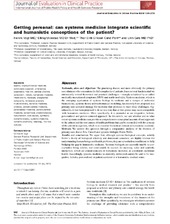| dc.description.abstract | Rationale, aims and objectives The practicing doctor, and most obviously the primary care clinician who encounters the full complexity of patients, faces several fundamental but intrinsically related theoretical and practical challenges – strongly actualized by so-called medically unexplained symptoms (MUS) and multi-morbidity. Systems medicine, which is the emerging application of systems biology to medicine and a merger of molecular biomedicine, systems theory and mathematical modelling, has recently been proposed as a primary care-centered strategy for medicine that promises to meet these challenges. Significantly, it has been proposed to do so in a way that at first glance may seem compatible with humanistic medicine. More specifically, it is promoted as an integrative, holistic, personalized and patient-centered approach. In this article, we ask whether and to what extent systems medicine can provide a comprehensive conceptual account of and approach to the patient and the root causes of health problems that can be reconciled with the concept of the patient as a person, which is an essential theoretical element in humanistic medicine. Methods We answer this question through a comparative analysis of the theories of primary care doctor Eric Cassell and systems biologist Denis Noble. Results and conclusions We argue that, although systems biological concepts, notably Noble’s theory of biological relativity and downward causation, are highly relevant for understanding human beings and health problems, they are nevertheless insufficient in fully bridging the gap to humanistic medicine. Systems biologists are currently unable to conceptualize living wholes, and seem unable to account for meaning, value and symbolic interaction, which are central concepts in humanistic medicine, as constraints on human health. Accordingly, systems medicine as currently envisioned cannot be said to be integrative, holistic, personalized or patient-centered in a humanistic medical sense. | en_US |

